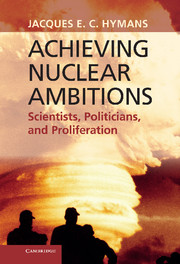Book contents
- Frontmatter
- Contents
- Figures
- Table
- Preface
- Abbreviations
- 1 The puzzle of declining nuclear weapons project efficiency
- 2 A theory of nuclear weapons project efficiency and inefficiency
- 3 Spinning in place
- 4 How did China’s nuclear weapons project succeed?
- 5 Proliferation implications of international civil nuclear cooperation
- 6 Proliferation implications of footloose nuclear scientists
- 7 Empirical extensions
- 8 Lessons for policymakers and directions for future research
- References
- Index
- References
2 - A theory of nuclear weapons project efficiency and inefficiency
Published online by Cambridge University Press: 05 June 2012
- Frontmatter
- Contents
- Figures
- Table
- Preface
- Abbreviations
- 1 The puzzle of declining nuclear weapons project efficiency
- 2 A theory of nuclear weapons project efficiency and inefficiency
- 3 Spinning in place
- 4 How did China’s nuclear weapons project succeed?
- 5 Proliferation implications of international civil nuclear cooperation
- 6 Proliferation implications of footloose nuclear scientists
- 7 Empirical extensions
- 8 Lessons for policymakers and directions for future research
- References
- Index
- References
Summary
In this chapter I seek to develop a coherent set of theoretical hypotheses on the causes of nuclear weapons project efficiency and inefficiency. I start from the basic observation that nuclear weapons projects are huge undertakings whose key day-to-day players are scientific and technical workers. When the workers are well motivated, the project is liable to run well; when the workers are poorly motivated, the project is liable to run poorly. Therefore, to explain the empirical variation in nuclear weapons project timelines to the bomb, I focus above all on how different management choices and political institutions affect scientific and technical workers’ motivation to perform collectively at a high level. Surprisingly, this is virgin terrain for the social-scientific literature on nuclear proliferation.
In brief, the argument of this book is pitched at two levels: the micro and the macro. First, at the micro level, I stress the critical importance of a management approach that respects the scientific and technical workers and permits them to exhibit their professionalism, while also appealing to their national pride. Second, at the macro level, I stress the critical importance of Weberian legal-rational institutional constraints on top-down political meddling, for in the absence of such constraints, meddling is very likely to happen. The top leadership can have strongly positive effects on nuclear weapons project efficiency when it focuses on offering inspiration and facilitation, but it has strongly negative effects when it seeks also to exercise intrusive command and control.
- Type
- Chapter
- Information
- Achieving Nuclear AmbitionsScientists, Politicians, and Proliferation, pp. 41 - 78Publisher: Cambridge University PressPrint publication year: 2012
References
- 1
- Cited by

